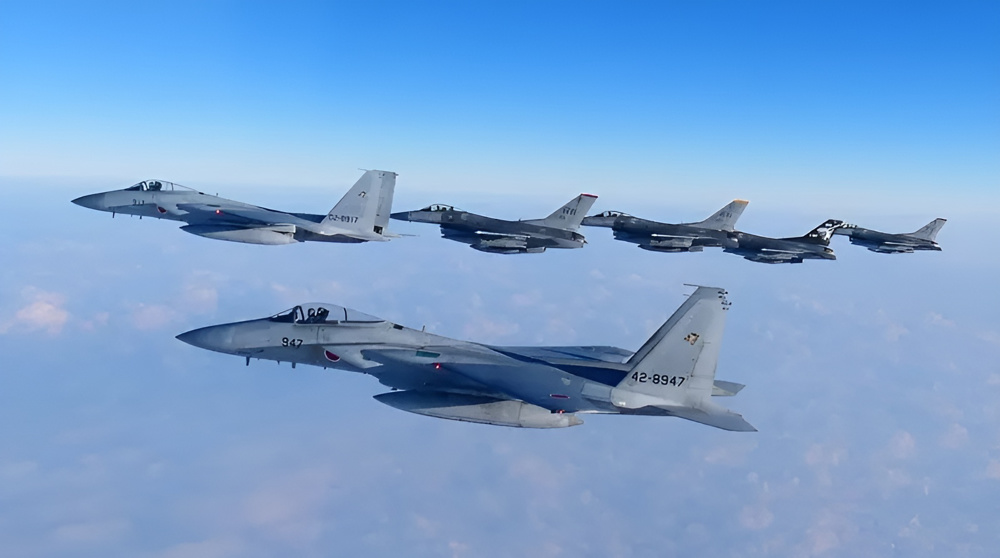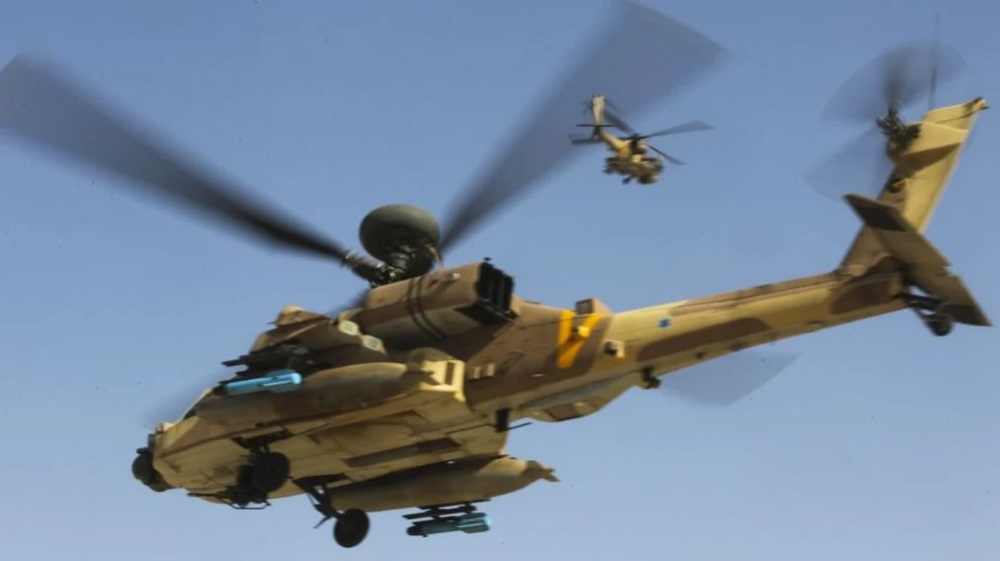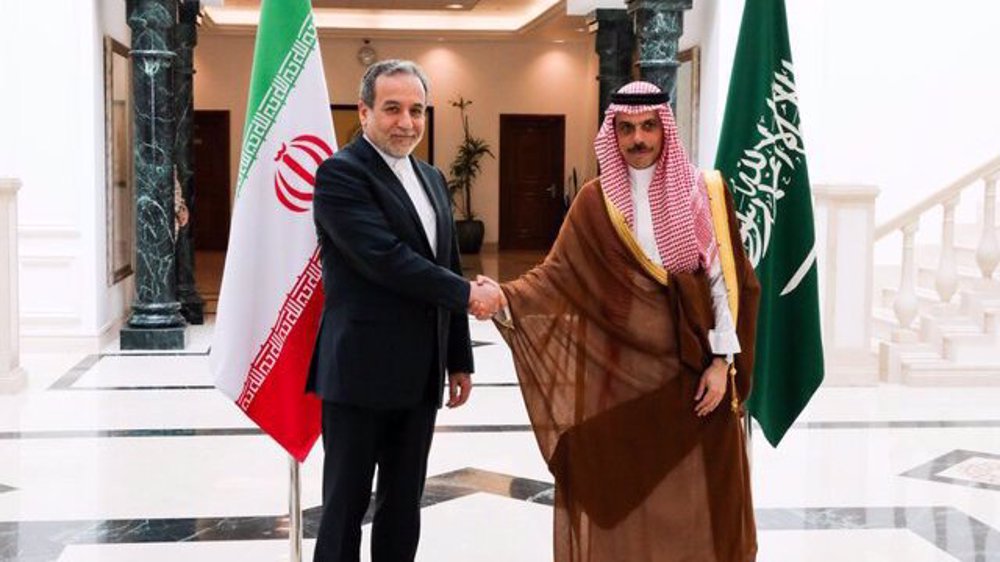Cash-strapped Pakistan gives scandal-hit Saudi crown prince lavish welcome
Amid much fanfare, the Saudi crown prince is visiting cash-strapped Pakistan on the first leg of an Asia tour in what analysts view as a charm offensive aimed at seeking allies and repairing his image, which has been badly tarnished on the world stage over the gruesome murder of dissident journalist Jamal Khashoggi at Riyadh’s consulate in Turkey as well as the war crimes the kingdom has been committing in Yemen.
Escorted by Pakistan’s fighter jets, the fleet of Mohammed bin Salman – known as MbS -- and his 1,000-strong entourage touched down in the Pakistani capital, Islamabad, on Sunday evening for a two-day visit.
Pakistani Prime Imran Khan and army chief Qamar Javed Bajwa greeted the crown prince upon his arrival at the Nour Khan air base where he was welcomed with a 21-gun salute.
#Pakistan fighter jets escort #Saudi crown prince's jet in Asia tour pic.twitter.com/axm1iRTee8
— On The News Line (@OnTheNewsLine) February 18, 2019
Khan personally drove bin Salman to the official residence of the prime minister, where he does not actually stay.
Security has been tightened Islamabad, with 1,000 new checkpoints erected around the capital and the adjoining garrison city of Rawalpindi.
The fortified diplomatic zone in Islamabad was sealed off, and the airspace over the city shut down.
Saudi and Pakistani flags were displayed throughout the capital, alongside portraits of MbS and Khan.

Pakistani authorities also blocked mobile phone and internet services in parts of the city, while Monday was also declared a public holiday.
Bin Salman’s visit was delayed by a day amid widespread protests.
Protesters took to the streets after Friday prayers in Rawalpindi, calling on the government not to allow the Saudi prince into the country.
The demonstrators blamed bin Salman for the killing of thousands of people, including the people of Yemen.
On the first day of the visit, Pakistan and Saudi Arabia inked several agreements in diverse sectors worth as much as $20bn for Pakistan.
On the second day of his trip, bin Salman, who is also Saudi Arabia’s defense minister, held talks with the Pakistani army chief. He will meet President Arif Alvi later on Monday, when he will be awarded the Nishan-e-Pakistan (Order of Pakistan) at a formal ceremony.
Pakistan is the first destination in bin Salman’s three-state Asia tour, which will also take him to India and China.
The visit comes as the de facto Saudi ruler has been grappling with a reputation crisis in the international community over Khashoggi’s murder, which is widely believed to have been personally ordered by him.
Khashoggi’s assassination has also put spotlight on the crimes the Saudi regime and a military coalition of its allies – led by bin Salman -- have been committing against Yemen over the past four years. There have been growing calls for Riyadh and its vassal states to end the bloody military campaign, which has led to the “world’s worst humanitarian crisis” in the Arab world’s already poorest nation.
MbS “wants to demonstrate that he is not an international pariah,” James M. Dorsey, a researcher at the S Rajaratnam School of International Studies in Singapore, was quoted as saying by the Middle East Eye news portal.
It is a matter of proving that he still has “international access and he can function ... as the most senior representative of Saudi Arabia beyond the king,” he added.
The lavish welcome in Islamabad comes as Pakistan is struggling to fix its crisis-hit economy and guarantee its economic future.
If the Pakistani government does not put an end to Saudi Arabia's harmful actions within its borders, peace will be at great risk.
— Al Jazeera English (@AJEnglish) February 17, 2019
And no aid package is worth that https://t.co/iQORQ2BZ7T — #AJOpinion, by @TahaSSiddiqui
Pakistan’s central bank has only $8bn (£6.2bn) left in foreign reserves and faces a balance of payments crisis.
Since he was sworn in last August, Khan has been aggressively seeking help from friendly countries in order to reduce the size of the bailout package that Pakistan is likely to need from the International Monetary Fund.
The country is seeking its 13th bailout since the late 1980s and Saudi Arabia has already provided a $6-billion loan.
At the height of the Khashoggi drama in October last year, Khan paid a visit to Saudi Arabia, where he attended an investment conference that was boycotted by world leaders and high-profile businesses in protest at the gruesome murder.
Back then, the Pakistani premier sought to justify his trip to the kingdom, saying Pakistan was going through the worst debt crisis of its history and was “desperate” for Saudi money.
“We’re desperate for possible Saudi loans to shore up Pakistan’s economy,” he said prior to his trip.
Four soldiers killed in Balochistan
The agreements signed on Sunday included a $10-billion refinery and petrochemicals complex in the coastal city of Gwadar in the resource-rich province of Baluchistan, where residents have long complained that their share of the vast gas and mineral wealth has not been fair.
Gunmen on the same day attacked a security post in Balochistan, leaving four paramilitary soldiers dead, officials said Monday.
“The four men suffered multiple gunshot wounds and died on the spot,” Khan Wasay, a spokesman for the Frontier Corps paramilitary force, told Reuters.
No group has claimed responsibility for the attack, but Baloch separatist groups and militants have attacked security forces in the province in the past.
The restive mineral-rich province is rife with separatist, extremist and sectarian violence and has been the scene of several bomb and gun attacks over the past years.
Bin Salman’s visit to Islamabad also coincides with a flare-up of Kashmir-related tensions between India and Pakistan.
The fresh wave of tensions broke out on Thursday, when 44 Indian troops lost their lives in a bomb attack claimed by Pakistan-based militants.
New Delhi accuses Pakistan of having a hand in the deadly attack -- an accusation Islamabad denies.
Over 2,000 Britons served in Israeli military during Gaza genocide: Report
Houthi: Iranian, Yemeni revolutions inspire Islamic nation in face of enemy plots
Iran defeating sanctions for decades since Islamic Revolution victory
AIPAC faces challenge as new PAC seeks to end US backing of Israel
VIDEO | Press TV's news headlines
Iran president hails ‘exceptional’ turnout in Islamic Revolution anniversary rallies
VIDEO | Pro-Palestine protesters rally in Melbourne on final day of Israeli president's Australia trip
Gaza genocide's death toll may exceed 200,000: Report














 This makes it easy to access the Press TV website
This makes it easy to access the Press TV website